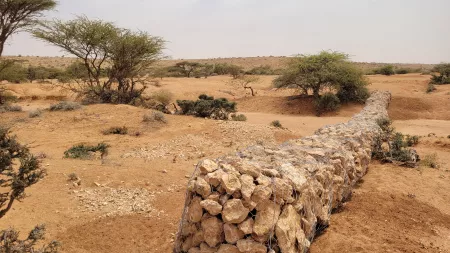It takes three hours of cross-country driving through the desert along unsteady trails with only a few bushes and larger stones as signposts to reach a village where CARE is working far from the main road. During the current drought, this is also the route that urgently needed water and food trucks have to take. The villagers are former pastoralists, most of whom have lost their livestock due to the drought. Some of the villagers still have a remnant herd, but the animals are so weak that they can no longer manage to walk to the water.
We have to bring the water to the animals so that they can drink.Ardo Dhunkel, 60, chair of a small savings and loans group established with CARE's support

It has not rained enough in Somalia for the last two years and this village has been particularly hit hard. The streets are dry as dust, there are hardly any plants or trees that still grow here and provide shade. The wind blows the sand into the eyes and with every breath the dust sits deeper in the lungs. Due to the distance and difficulty to reach the village, water deliveries are four times more expensive than in other villages located along the main roads. One water delivery, that is 40 water barrels, and in one barrel fit about 200 liters of water. The village with about 600 inhabitants pays about 200 US-dollars for such a delivery. Converted, that is about 13 liters of water per person, which must last for an entire month.
Since the village is far away from other villages and towns, there are hardly any income sources for its inhabitants.
The only thing we could do was to sell our cattle when the market price was good. Now there is no sale. My family still owns about 100 sheep and goats. Before the drought, we owned more than 500. Most of them died because we could not give them water or food.
Her children take care of the livestock and move around with the animals to find water and food. However, many of the animals are very weak or sick.
In the village, Ardo runs a small store, where she sells food, detergent, shoes and other small daily necessities.
It is hard. I don't have enough customers. Now, most people buy on loan because they no longer have an income due to the current drought.Ardo Dhunkel, 60, chair of a small savings and loans group established with CARE's support
She gets her goods delivered from the next largest town, which is a three-hour drive across the desert. The cost of transportation and food is rising. The price of rice, sugar and wheat for a month has risen from 90 to 130 Euros.
Inflation and the rising market price make it very difficult. The war in Ukraine is also affecting our prices,” Ardo continues. “Every month, we get less to eat. It will only get better when it finally rains.
If things continue like this, Ardo will have to close her store because her customers are not able to pay. Though her dream is to expand her store and hire someone to help her.
After breakfast – a wheat flour paste – with her granddaughters at 7 a.m., she goes to her store, which is right in front of her house. She opens the doors and starts sorting her goods. The dust and sand of the dry streets is also visible here inside the store on the packages. With a feather duster made of dry grass she removes the coarsest and waits for the first customers. On good days, 15 villagers visit her store – usually before the main meals. Around 12:30 p.m., she closes the store for lunch – rice with some meat. After lunch she is back in her store until 9 p.m. In a big blue book, she writes down all of the loans. Some people have a whole page to themselves, listing up to 30 items they have bought. “No one has the money to even buy rice,” the grandmother said.

With cash assistance, CARE supports Ardo and other villagers. By setting up small savings and loans groups, villagers are also able to get loans for their businesses.
But the drought is also affecting the small savings group. We cannot hold our meetings as regularly as we used to because we have to walk very far with our herds of animals to find water. Also, most of the residents do not have the money to save.
The people of Somalia are in desperate need of support. “We are in great need. We need more help so we can survive,” Ardo concludes.

Here is how CARE helps people in this village affected by drought in Somalia:
In addition to cash assistance and small savings groups, CARE is helping the village by maintaining and constructing water tanks.
